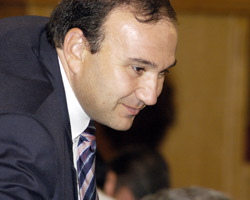In the past year, the main event in politics was the constitutional amendments referendum. One of the discussions being led was taking out the ban put on dual citizenship in the former Constitution.
There is no longer a ban on dual citizenship and the Armenian Revolutionary Federation (ARF), which is a member of the coalition, is planning on presenting a draft of the law on dual citizenship during the spring session of the National Assembly. How do they plan on regulating this field?
According to leader of the ARF National Assembly group Levon Mkrtchyan, laws must be passed in certain fields and the ARF emphasizes the citizenship sector because after all, there is no more ban and dual citizenship is allowed by the Constitution. Even before the constitutional amendments referendum, the ARF was announcing that they have prepared 60-70% of the law on dual citizenship of the Republic of Armenia.
“Our group members have met with some professionals both in Armenia and the Diaspora,” says L. Mkrtchyan and adds that the questions formulated primarily express point of views.
“We plan on presenting our point of views about the law and the draft during the spring session of the NA and we will put that into circulation,” says leader of the ARF group. According to Minoyan, the group working on the draft is in the final stage.
“We will first present our point of views on the law and put it up for discussion, after which we will present the law based on those point of views,” says Mr. Mkrtchyan as he goes further in detail. He adds that that law will make changes in many other laws.
What do the ARF members think about the Armenian dual citizen’s right to vote? According to Mkrtchyan, the right to vote, get elected, pay taxes, serve in the army and other rights are much easier to deal with because they are regulated by international conventions. Minoyan claims that Armenia has signed most of the conventions that regulate the issues concerning serving in the army and taxes. “We must make sure everything is equal; basically, the citizen will fulfill his responsibilities and get the corresponding rights,” says L. Mkrtchyan. Also, if the citizen pays all the necessary taxes of the given country, has a permanent settlement qualification and fulfills all the requirements, then that person will have the right to vote and get elected.
What does it mean to have “permanent settlement qualification”? According to the leader of the ARF group, he already has the corresponding qualification for the president and MPs stated in the Constitution.
“There will be a similar clause in the dual citizenship law,” he says. According to Mkrtchyan, the issue is formulated through the following question: Are we passing a law on dual citizenship concerning Armenians of origin and nationality living outside of the Homeland and giving them the right to become Armenian citizens, or are we simply passing the dual citizenship clause for everyone, including the citizens that currently live in Armenia?
“There are some parts of the law that deal with the blood principle; there are countries that apply the territory principle. These two principles are accepted by the former and present day Constitution,” says the MP and places emphasis on the perception of this law in the National Assembly and in society.
We all know that in the beginning of the 1990s, we had what was called “status certificate”. The citizens of other countries that weren’t citizens of Armenia and who received those certificates were provided with all the rights of a regular Armenian citizen, except the right to vote and own property. Question: what issue doesn’t the status certificate solve that the dual citizenship law is trying to solve?
“The status certificate gave some civil rights, but did not give the citizenship right. This hurt our compatriots who wanted to have intimate relations with the Homeland,” says Mkrtchyan. Don’t the authors of the law draft fear that the citizens of Armenia will be the ones with the most desire to get dual citizenship rather than our compatriots living abroad?
“Of course, we are aware of that, however, we have to try to make sure the law does not exclude our compatriots living abroad from receiving Armenian citizenship,” says L. Mkrtchyan. According to him, they are not proposing “passing the dual citizenship law just like that”, but rather passing the law based on history.
Why are we doing away with the ban on dual citizenship? Mkrtchyan said the following in response to his question: “Due to the Genocide and other reasons, a large part of our compatriots were forced to leave the Homeland and live in foreign countries. Those people have the right to have Armenian citizenship. We are giving them that right and not just accepting it.” Basically, the Republic of Armenia will soon have a law on dual citizenship.

